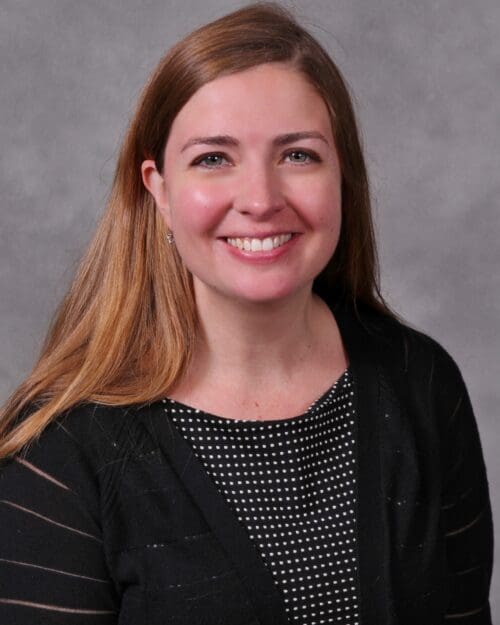Alicia January has a goal of classroom innovation and engagement

Alicia January, assistant professor of Psychology at Purdue University Northwest (PNW), has a goal. That goal is to be an innovative and engaging educator.
“That means I’m always improving my instructional approach to be able to reach a range of student learners,” says January.
Building rapport
January strives to build rapport with students. “Learning students’ names and faces and trying to make sure they are known on campus is important,” says January. “It’s easy to do in the smaller lectures that we most often teach at Purdue Northwest.”
She acknowledges that understanding and working with students also helps build rapport. “It’s a balancing act of being flexible but also holding students to a high standard,” she adds.
Connecting with students
January uses several methods of teaching to create an interactive classroom experience. “I try to make sure that my lectures are interspersed with discussions as well as activities and opportunities to apply the material in meaningful ways,” explains January. “Making the material more relatable and engaging makes it more memorable.”
In her Elementary Psychology class, instead of a standard lecture on attachment styles, she had students watch videos of caregivers and toddlers. The students were then asked to identify attachment styles and participate in a classroom discussion. In her Research Methods in Psychology class, rather than reading or listening to a lecture on observational studies, January had the class design their own observational study.
 A niche specialty
A niche specialty
A trained and licensed clinical psychologist, January’s research interests focus on interventions and outcome research for children and young adults with pediatric spinal cord injuries or spinal cord dysfunction. She has been on the medical and research staff at Shriners Children’s Chicago since 2012.
“I love the research and the clinical work that I do at Shriners,” says January. “Their commitment to care, the population they serve, as well as taking care of children across the financial spectrum, has become a calling for me.”
Her most recent research project at Shriners on behavioral intervention had her working with young adults who had childhood spinal injuries. “We were looking at sleep and activity behaviors, or what we would call modifiable health behaviors,” says January. “These are the kind of behaviors we can change by helping the participants identify the changes they want to make and supporting them in making those changes.”
January’s work at Shriners also benefits her students at PNW. “The research I’m doing at Shriners provides me with real-world experience that I can then bring into the classroom,” she says. “I’m able to talk about concepts in an applied way and not just theoretically.”
She also notes her most recent research grant was done through a partnership between PNW and Shriners. “These types of community partnerships are a good way for Purdue Northwest to be directly engaged in the community,” she added.
A really cool field
January also has a favorite course she teaches at PNW – Elementary Psychology. “There are two things that make it a fun class to teach,” she explains. “The majority of students in the class aren’t psychology majors and are being introduced to the field for the first time. I enjoy seeing these students connect with the course material and be able to relate it to the real world.”
The other element of fun for her is the broadness of the topics presented in the course. “It’s fun for me to be able to teach the areas of psychology I don’t normally get to spend time on,” she says. “In psychology we often have to specialize in a single area, but that doesn’t mean we don’t think other areas of our field are really cool.”